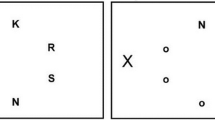Abstract
In five experiments involving more than 1800 undergraduate students, males more accurately located places on maps of the United States or its various regions than did females. These gender differences could not be attributed to education, travel history, desire to travel, or in the amount of incidental exposure to several potential sources of geographic information in everyday life. Males performed more accurately than females on measures of egocentric and allocentric spatial orientation, but performance on these tasks was only weakly predictive of accuracy on tests of geographical knowledge. Since males and females learned the locations of places on an unfamiliar map at similar rates, regardless of whether such learning occurred under intentional or incidental instructions, gender differences in geographical knowledge cannot be attributed to differences in capacity to learn place locations on maps. An attentional hypothesis is proposed to account for the more accurate performance of males on tests of geographical knowledge.
Similar content being viewed by others
References
Albert, M. S., Butters, N., & Levin, J. Temporal gradients of retrograde amnesia of patients with alcoholic Korsakoff's disease. Archives of Neurology, 1979, 36, 211–216.
Annett, M. A. A classification of hand preference by association analysis. British Journal of Psychology, 1970, 61, 303–321.
Beatty, W. W., & Tröster, A. I. Neuropsychology of spatial memory. In H. Whitaker & A. Caramazza (Eds.), Contemporary reviews in neuropsychology. New York: Springer-Verlag, in press.
Benton, A. L. Visuoperceptual, visuospatial, and visuoconstructive disorders. In K. M. Heilman & E. Valenstein (Eds.), Clinical neuropsychology (2nd ed.). New York: Oxford University Press, 1985.
Benton, A. L., Levin, H. S., & Van Allen, M. W. Geographic orientation in patients with unilateral cerebral disease. Neuropsychologia, 1974, 12, 183–191.
Butters, N., & Barton, M. Effect of parietal lobe damage on the performance of reversible operations in space. Neuropsychologia, 1970, 8, 205–214.
De Renzi, E. Disorders of space, exploration, and cognition. New York: Wiley, 1982.
Gould, P., & White, R. Mental maps. Baltimore, MD: Penguin, 1974.
Harris, L. J. Sex-related variations in spatial skill. In L. S. Liben, A. H. Patterson & N. Newcombe (Eds.), Spatial representation across the life span: Theory and application. New York: Academic Press, 1981.
Hart, R., & Berzok, M. Children's strategies for mapping the geographic-scale environment. In M. Potegal (Ed.), Spatial abilities: Development and physiological foundations. New York: Academic Press, 1982.
Linn, M. C., & Petersen, A. C. Emergence and characterization of sex differences in spatial ability: A meta-analysis. Child Development, 1985, 56, 1479–1498.
McGee, M. G. Human spatial abilities: Psychometric studies and environmental, genetic, hormonal, and neurological influences. Psychological Bulletin, 1979, 86, 889–918.
Money, J. A standardized road map test of direction sense. Manual. San Rafael, CA: Academic Therapy Publications, 1976.
O'Keefe, J., & Nadel, L. The hippocampus as a cognitive map. Oxford: Clarendon Press, 1978.
Oldfield, R. C. The assessment and analysis of handedness: The Edinburgh inventory. Neuropsychologia, 1971, 9, 97–113.
Author information
Authors and Affiliations
Additional information
We gratefully acknowledge the assistance of Richard Thompson, Hal Dengerink, Russ Glasgow, Lauren Lyon, James Malott, Hal Bertilson, Carol Barnes, Judith Goggin, Wendy Stock, Lyn Devenport, Shelton Hendricks, Julia Wallace, Rex Bierley, Herbert Pick, Tom Vilberg, Peter Frey, William Greenough, Billy Barrios, Arnold Gerall, Richard Bauer, Paul Ellen, Robert Klepac, Doug Nelson, Richard Fanelli, Jan Juraska, Don Meyer, Dave Riccio, Jan Hastrup, Lynn Hasher, Tony Sclafani, F. Robert Brush, and Jeff Blaustein, who collected data reported in Experiment 1. Brian Gladue made helpful suggestions regarding the conduct of Experiment 4. Harry Whitaker introduced us to the pathfinding test used in Experiment 5.
Rights and permissions
About this article
Cite this article
Beatty, W.W., Tröster, A.I. Gender differences in geographical knowledge. Sex Roles 16, 565–590 (1987). https://doi.org/10.1007/BF00300374
Issue Date:
DOI: https://doi.org/10.1007/BF00300374



